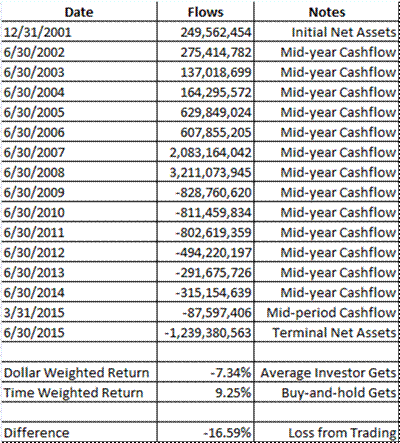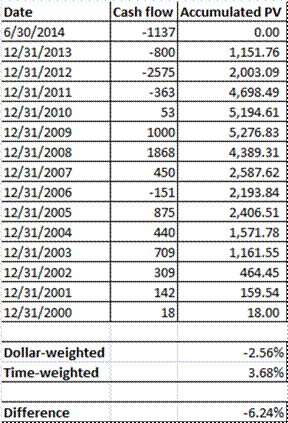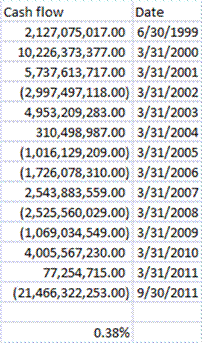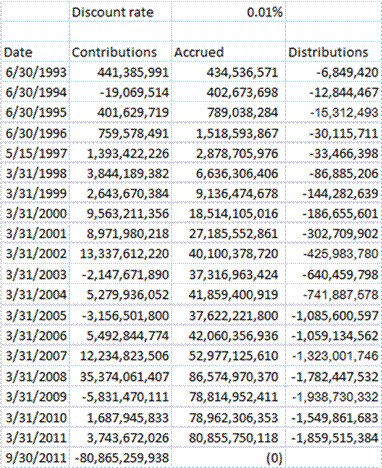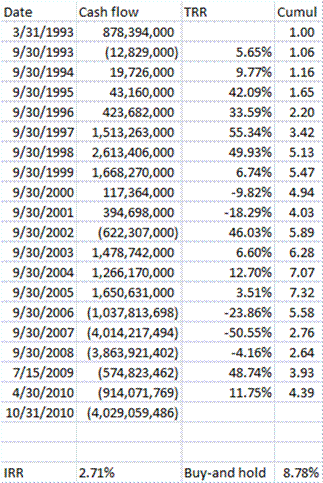We Eat Dollar Weighted Returns ? III (Update)
Photo Credit: Sitoo || No, you can’t eat money. But without money farmers would have a hard time buying what they need to grow crops, and we would have a hard time bartering to buy the crops
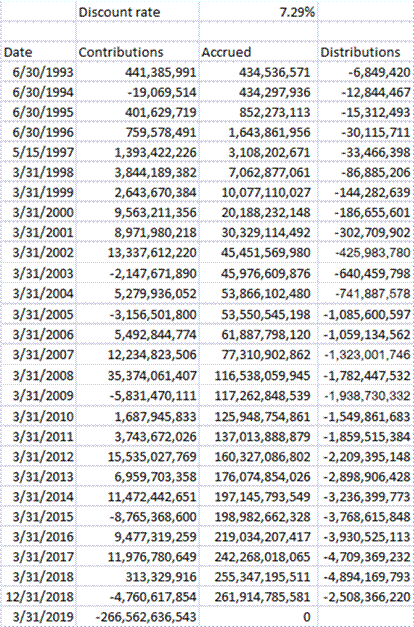
Tonight I am going to talk about one of the most underrated concepts in finance — the difference between dollar-weighted and time-weighted returns, and why it matters.
So far on this topic, I have done at least seven articles in this series, and you can find them here. The particular article that I am updating is number 3, which deals with the granddaddy of all ETFs, the SPDR S&P 500 ETF (SPY), which has been around now for almost 27 years. It is the largest ETF in the world, as far as I know.
From the end of January 1993 to the end of March 2019, SPY returned 9.42%/year on a time-weighted or total return basis. What that means is that if you had bought at the beginning and held until the end, you would have received an annualized return of 9.42%. Pretty good I say, and that is an advertisement for buy and hold investing. It is usually one of the top investing strategies, and anyone can do it if they can control their emotions.
Over the same period, SPY returned 7.29%/year on a dollar-weighted basis. What this means is if you took every dollar invested in the fund and calculated what it earned over the timespan being analyzed, they would have received an annualized return of 7.29%.
That’s an annualized difference of 2.13%/year over a 26+ year period. That is a serious difference. Why? Where does the difference come from? It comes partially from greed, but mostly from panic. More shares of SPY get created near market peaks when everyone is bullish, and fewer get created, or more get liquidated near market bottoms. Many investors buy high and sell low — that is where the difference comes from. This also is an advertisement for buy and hold investing, albeit a negative one — “Don’t Let This Happen To You.”
Comparison with the 2012 Article
Now, I know few people actually look at the old articles when I link to them. But for the sharp readers who do, they might ask, “Hey, wait a minute. In the old article, the difference was much larger. Time-weighted was 7.09%/year and dollar-weighted was 0.01%/year. Why did the difference shrink?” Good question.
The differences between time- and dollar-weighted returns stems mostly from behavior at turning points. As I have pointed out in prior articles, typically the size of the difference varies with the overall volatility of the fund. People get greedy and panic more with high-volatility investments, and not with low-volatility investments.
That said, most of the effects of the difference are created at the turning points. During the midst of a big move up or down, the amount of difference between dollar- and time-weight returns is relatively small. The big differences get created near the top (buying) and the bottom (selling).
So, since the article in 2012, the fund has grown from $80 billion to over $260 billion at the end of March 2019. There have been no major pullbacks in that time — it has been a continuous bull market. We will get to see greater divergence after the next bear market starts.
Be Careful what you Read about Dollar-Weighted Returns
I’m not naming names, but there are many out there, even among academics that are doing dollar-weighted returns wrong. They think that differences as cited in my articles are too large and wrong.
The idea behind dollar-weighted return is to run an Internal Rate of Return calculation. To do that you have to have a list of the inflows and outflows by date, together with the market value of the fund at the end as an outflow, and calculate the single rate that discounts the net present value of all the flows to zero. That rate is the dollar-weighted return, and you can use the XIRR function is Excel to help you calculate it. (Note that my calculations use a mid-period assumption for when the cash flows.)
The error I have seen is that they try to make the dollar-weighted calculation like that of the time-weighted, creating period by period values. Now, there is a way to do that, and you can see that in the appendix below. As far as I can tell, they are not doing what I will write in the Appendix. Instead, they treat each year like its own separate investing period and calculate the IRR of that year only, and then daisy-chain them like annual returns for a time-weighted calculation.
Now, the time-weighted calculation does not care at all about investor-driven cash flows, like purchases and sales of fund shares, aside from dividend payments and things like that. It does not care about the size of the fund. It just wants to calculate what return a buy and hold investor gets. [Just remember the rule that an NAV must be calculated any time there is a cash flow of any sort, otherwise some inequity takes place.]
The dollar-weighted calculation cares about all investor cash flows, and ultimately about the size of the fund at the end of the calculation. It doesn’t care about when the returns are earned, but only when the cash flows in and out of the investment.
The odd hybrid method is neither fish nor fowl. Time-weighted corresponds to buy and hold, and dollar-weighted to the returns generated by each dollar in the fund. The hybrid says something like this: “We will calculate the IRR each year, but then normalize the fund size each year to the same starting level so that the fund flows at tops and bottoms do not compound. Then we show them year-by-year so that the returns are comparable to the total returns for each year.
As H. L. Mencken said:
Explanations exist; they have existed for all time;?there is always a well-known solution to every human problem?neat, plausible, and wrong.
Source: Quote Investigator citing Mencken’s book “Prejudices: Second Series”
In an effort to make a simple annual comparison between the two, they eradicate most of the effects of selling low and buying high. More in the Appendix.
Summary
Be aware of the difference between dollar-weighted and time-weighted returns. If you have a strong control on your emotions, this is not as important. If you tend to panic, this is very important. It is more important if you buy highly volatile investments, and less so if you size your volatility to your ability to bear it.
To fund managers I would say this: if you are tired of all of the inflows and outflows, and are tired of getting whipsawed by your clients, maybe you should take a step back and lower the overall risks you are taking. This will benefit both you and your clients.
Appendix
Here’s how to run an annual calculation of dollar weighted returns that be correct. For purposes of simplicity, I will assume a simple annual calculation that has multiple cash flows inside it. (If we are working with a US-based mutual fund, there would be reporting of change in net assets every six months.)
Calculate the first year (dw1) the way the hybrid method does. No difference yet. Then for the second year, run the IRR calculation for the full two-year period (IRR2). Then the second year only dollar-weighted return (dw2) would be:
((1+ IRR2) ^2) / (1+dw1) -1 = dw2
and for each successive period it would be:
(1+IRR[n])^n(1+IRR[n-1])^(n-1) – 1 = dw[n]
That is more complex than what they do, but it would preserve the truths that each entail. It would make the values for the yearly dollar-weighted returns look odd, but hey, you can’t have everything, and the truth sometimes hurts.
Full disclosure: a few of my clients are short SPY as part of a hedged strategy.




